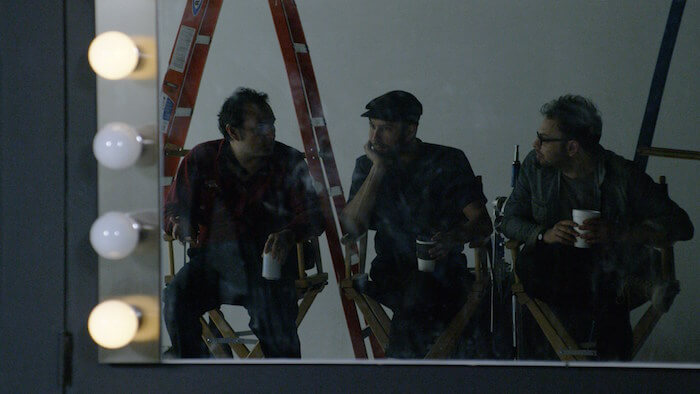At Tribeca: Actor Martinez

Nathan Silver’s Stinking Heaven, released last year, concerned a small community of like-minded people living in close quarters with one another, and dramatically reenacting their lowest, screamingest, most pathetic moments for a video camera similar to the one the film was shot on, for nominally therapeutic purposes. The parallels to a film set—in particular a set for a film predicated on improvisation and its potential for vivid revelations, perhaps achieved at the cost of clear work/life boundaries—were evident, if perhaps more acutely so to a viewer than to the professionals involved in filming. When I interviewed the Crown Heights-based Silver last summer, he clarified that “I never go about setting up a tension-filled environment, but when you have little in the way of budget and many people stuffed into small spaces during the height of summer, tensions naturally arise.”
The tensions that arise, on set but also in the mind of the viewer, who may grow uncertain and uncomfortable about the emotional sausage factory, is even more the point of Actor Martinez, codirected by Silver and Mike Ott, which plays at the Tribeca Film Festival three more times beginning tonight. Actor Martinez is one of the more interesting American independent films of the moment—transparent in its artifice, and artificial in its transparency.
The star of the film is Arthur Martinez, a computer repairman and part-time actor in Denver, Colorado. Actor Martinez began when Arthur tried to recruit Mike Ott—director of three poetic, semi-ethnographic indies set in California’s Antelope Valley—to direct a short film with Arthur as the star (the two had met at the Denver Film Festival, where Arthur volunteered; there’s a bit more background here). From there, Ott and Silver, not previously collaborators but simpatico in their views on open-endedness in both process and product, took over—which is not quite the same as saying they imposed an iron will on their subject. Rather, the shoot seems to have taken on a life and agency of his own: “It obviously changed once we were on the ground,” Silver told me over email this month, “as is the case with every shoot.”
Actor Martinez begins as a portrait of Arthur Martinez as he goes about his routine: listening to Insane Clown Posse in his car; fixing computers, rolling joints from his considerable stash of Colorado-legal marijuana, and attending meet-ups for Denver locals on the outskirts of the local indie film community. (One is also working on a line of “exercise swimwear”; when asked, aren’t you homeless, he clarifies that he’s an “apartment dweller,” but autistic.) Arthur’s main acting gigs apparently including enacting seizures, injuries and mental distress for EMT trainings—another echo of Stinking Heaven.
Gradually, it becomes clear that these are scenes from an untitled fiction film starring Arthur Martinez as a guy very much like Arthur Martinez. This film within the film Actor Martinez is directed by “Nathan Silver” and “Mike Ott” (played by Nathan Silver and Mike Ott). The two become increasingly present in the film, which concerns their efforts to make a good, dramatic, compelling movie out of Arthur’s life.
Increasingly, this seems an uphill battle. “We did try to figure out ways to get him to open up, and you can see the results in the movie,” Silver told me. From what we see, the two filmmakers try to goad displays of emotion out of the somewhat conflict-averse Arthur (who says he normally cries on-camera by putting an irritant under his eyes). They cast an actress to play his girlfriend, and advising Arthur the actor to “pretend she’s your ex-wife,” in between shots of improvised scenes, and openly swear at him when scenes don’t work, when Arthur shuts down. Eventually, they bring in the established actress Lindsay Burdge (played in the film by the accomplished indie-film actress Lindsay Burdge) to play Arthur’s girlfriend—named not “Lindsay,” but “Trish.”
As the filmmakers chase after some kind of messy, potentially therapeutic truth—and discuss their efforts in boozy, very meta production meetings with their subject—their direction becomes increasingly confrontational, from their admonishments of Arthur (“Don’t phone it in!”) to an eventual breakdown with Burdge, when they spring an unscripted sex scene on her. Though that scene—both the setup and Burdge’s eventual discomfort at being so exposed and unprotected—is staged in an obviously planned single take, it does encourage us to tack on a real psychic cost to our understanding of Actor Martinez. (Silver clarifies that “We didn’t intentionally want to make a critique or a metaphor but the audience will obviously read into the movie, and we’re more interested in what they make of it than in what we intended.”) As the film and the film-within-the-film inform and bleed into one another, it prompts us to wonder about a similar relationship between what we see on-screen, and what went into it; Silver allows that “the offscreen space was even more complicated than what you see onscreen.”
Actor Martinez feels at once rigorous and out of control. We see the production team redesigning Arthur’s apartment to fit in more with the overall richly underlit scheme of the film, and Adam J. Minnick’s cinematography features drifting camera movements that settle onto conspicuously metaphorical mirrors. But the different layers of the story are deliberately obscured, in ways that feel both orchestrated and raw. Camera movements and sound bridges connect dramatic actions from the film-within-the-film, and the story of its making, into single seamless sequences, confusing the boundaries between the film’s structural layers; probably the best scene in Actor Martinez is an extended argument between Martinez and Burdge in which it’s unclear who’s “acting”—it changes from moment to moment, and more than that, one of the film’s main insights is that performance is not a binary classification.
This is especially so in the case of the performances, or presences, or some combination thereof, of the film’s minor characters. In particular, there’s Arthur’s friend Kenny—played by Kenneth Berba, a Denver local with a couple of previous shorts to his name—an aspiring standup comic who tells stammering jokes that take forever to finish, because he keeps stuffing food in his mouth during the setup, and the apparent punchline (some kind of Banana Republic/“Banana Democracy” joke) is so lame and obscure that it can’t possibly be finished yet. The miraculous Kenny is, as David Jenkins wrote for Little White Lies, “either a bumbling doofus or some kind of anti-comic genius who is himself getting one over on Ott and Silver as they try to get one over on him.” When I asked Silver about the balance of character-building versus unmediated documentary in portraying Kenny and others, he responded simply, “It ran the gamut. Even for us, it’s hard to say what’s fiction and what’s documentary.”
This is increasingly a recognition governing the field of nonfiction film in general—put into practice, it means that any cinematic attempt to depict “reality” or “truth” must also account for, and ideally question, the assumptions and problems, practical and ethical, that inevitably warp that attempt. It’s perhaps no surprise that Silver says he and Ott are “both working on documentary projects and even plotting another movie together.” Their subject matter is inexhaustible because their process throws up new complications faster than it can resolve them.
You might also like 



















